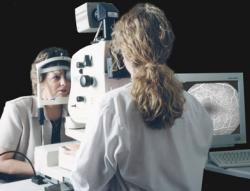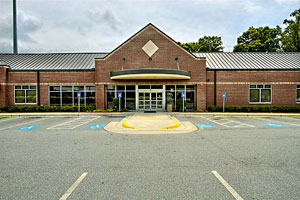Diabetic Retinopathy
 Diabetic retinopathy is a disease that leads to blurry, distorted vision and blindness. It occurs when diabetes weakens blood vessels inside your eye. These weak vessels leak fluid into an area of the eye called the retina. New, distorted vessels may grow, and then bleed. These vessels can damage areas of the retina, causing vision loss.
Diabetic retinopathy is a disease that leads to blurry, distorted vision and blindness. It occurs when diabetes weakens blood vessels inside your eye. These weak vessels leak fluid into an area of the eye called the retina. New, distorted vessels may grow, and then bleed. These vessels can damage areas of the retina, causing vision loss.
You can have diabetic retinopathy without knowing it. Usually, there is no pain and no outward sign. Over time, you may notice gradual blurring or some vision loss. Symptoms may come and go. If diabetic retinopathy is severe, you may have clouded vision or blindness.
Controlling diabetes and other risk factors may prevent or limit retinopathy. Follow your diabetes treatment plan, watch your diet, get regular exercise, take medicines as prescribed, check your blood sugar levels as often as you family doctor suggests. If you smoke, quit. If you have high blood pressure, keep it under control.
Have an eye exam every year or as often as your doctor suggests. During the exam, the doctor asks about your health and family history. This helps him or her know your risk of getting diabetic retinopathy. You may also have tests to measure your vision. Your doctor may dilate your eyes and use special instruments to view and take pictures of your retina. A fluorescein angiogram is a test that uses a special dye to create detailed images of the retina. These images help your doctor decide whether special treatments are needed.
Treatment may help slow the progress of diabetic retinopathy. Sometimes it also restores lost vision. Special treatments can help stop bleeding, slow new vessel growth, and preserve vision. The type of treatment you get depends on your condition. Laser treatment can help stop leaks and limit vessel growth. Surgery can repair a damaged retina. Surgery can also remove the vitreous. This surgery may help if the vitreous becomes filled with blood and obscures your vision.
(Adapted from material copyrighted by Krames, a division of StayWell Company)

